Welcome to Advertising in America, the podcast, where we meet entrepreneurs, where they're at in their marketing and bust through their bottlenecks, breakpoints, and blind spots hosted by Wizards, Ryan Chute, and the Royal Torbay twins, where we put the fun in marketing fundamentals. Are you ready to dominate your marketplace?
Are you ready for outrageous advertising? Do you want to become a household name brought to you by Wizard of Ads for Services?
Visit us at wizardofads.services to book your free strategy session with Wizard Ryan Chute today.
Ryan: On today's episode of Advertising in America, we're splitting hairs between difference and distinction. Is your company, culture, community, and customers different? Or are they just confusing? Do you do things differently? Or are you cooking the same Costco steaks that everyone's putting on the table? Are you different-different? Or are you unique, like everyone else? Here's Mick Torbay to split the difference, Mick.
Mick: Every company is different, what works for one won't work for another. If your advertising experience comes from simply watching ads and drawing your own conclusions, it's easy to oversimplify. Got a great idea for a beer commercial? Call Budweiser. If they don't buy it, try Heineken. Beer is beer, right? Those of us in the marketing business know what motivates a Bud is very different from what appeals to a Heineken drinker.
There's real value in big agency thinking and not just for international brands. In any small business, there are aspects that make one different from another, those differences can be the key to a message that resonates. Real matters. Only a fool looks at another company's ad and says, we should do that. That's an amateur move. Small and medium-sized businesses do this all the time, by the way. They see what the leader is doing and they conclude, that must be the best way to do it. How could it be wrong if they're the leader? But you might be confusing cause and effect. They might the leader because of their marketing, but they could be leader because they have the best business idea, and marketing simply points a spotlight on it. There are three good reasons to never do what the leader is doing. Number one, you'll never stand out by doing what somebody else is doing. Number two, they're probably spending more money than you, so they already own that idea. Consumers will never associate that with you. Number three, what they're doing is real, you'll be building your message on a fiction, that's a dangerous plan. If you didn't have a plan to be different in your category, why did you start a business in the first place?
And if you're counting on your ad guy to invent those differences, then you better have a really good ad guy. Because he's the one setting you apart to the consumer, not you. That makes him your boss, instead of the other way around.
Ryan: Mick Torbay, everyone. Many people don't know this, but Mick was the lead singer of a Canadian boy band around about the same time as Robin Sparkles. In Classic Boy Band Fashion, he was 28 at the time and not at all creepy in his stretchy dance pants. Chris Torbay, do you have something different to say?
Chris: I hope your company is different. I hope you have something unique, and interesting, and differentiating that I can build a campaign around. Unfortunately, most companies gleefully justify this with something they think is differentiating but really isn't. Almost every company I've worked for in-home services, for example, has said, what sets us apart is our people really care.
Those other guys are just doing the work, whereas our people, they really want to help. Everyone says it. Every single one. Every car company says their cars are the ones that are fun to drive. How do minivan makers claim they're the ones that are fun to drive? That's not what's different. All beers claim to be refreshing. All law firms, expertise, and great client service. Every single one of them.
That thing that you think is differentiating is actually the most common thing in companies like yours. But the troublesome part of this is when they think, they're cautioning me that I'm going to have to rethink the way I do my job. This product is aimed at chartered accountants, so your typical ads won't work. These are numbers guys with facts, and figures, and spreadsheets, they're nerds about boring tables of data. Yeah. And at the end of the day, they go home and watch the football game with a Bud and a bag of Doritos. Their job is boring and nerdy, but their brains aren't wired to respond better to boring and nerdy messaging. They respond to interesting, compelling, memorable advertising, just like everyone else.
Or people will say, you can't use certain media, especially traditional media because, “My target is a different kind of an audience. These kids today, they don't watch TV, they're Gen Z.” Where does Google advertise the Google Pixel Phone? TV, radio, print, and outdoor, just like all the others. Really? Aren't you Google? Aren't you different? The challenge is always the same. Find something differentiating about the brand, then create a relevant message, aimed at a relevant target, and run it on relevant media.
Ryan: Who wrote this genius? It sounds so out of character for you. When we get back, we'll do something different. I promise, hopefully, better. Stay tuned.
Hey, listeners. Wizard Ryan Chute here. Want a personalized strategy that instantly 4X the effectiveness of your marketing dollars? Schedule a free call with me at wizardofads.services. We'll chat about your goals and how you can quickly dominate your marketplace. I have limited availability though, so don't delay.
Well, I guess you could delay a bit, but not too much. That'd be like an over-delay. So maybe you just skip the delay part entirely and book a call just as soon as you're ready to start making money. You certainly don't to delay that, right? And now, pitter-patter.
Ryan: We're back. Hey, fun fact. Anti-branding, or debadging, has become continually more popular where brands just minimize or eliminate their brands from the products in an effort to become more popular. Company Muji from Japan, has chosen to eliminate their logos and brand marks on all of their clothing, allowing the designs to speak for themselves. Even BMW has a badge delete option on all of their custom order options. Branding is taking a different face today and we have to pay attention to that as we start looking at what's going to make you stand out. Cause it's not always going to be that logo or that trademark.
Mick: I'd say, deleting your logo is a dangerous activity.
Chris: Yeah. I mean it's funny, I've worked for a number of different car brands, and there's a lot of brands now that do the “black edition”, right? Where instead of the shiny name badge on the back, that they'll make them black, whatever. What is critical to is that the other branded aspects of that vehicle design are perfectly obvious. So, BMW, I'm sure they will have the double square grill, right? So, they may take the little blue and white airplane propeller off. But you're darn sure, there are going to be other things that people who know, who will still know, will know.
Ryan: There's a certain level of exclusivity to that, there's a certain level of cachet of status that goes along with those things.
Chris: Exactly, it's like the secret menu at Starbucks. Yes, they want it to be a secret. Yes, they want it to be a very open secret.
Ryan: The world’s worst-best kept secret. Look, we also have to recognize that BMW has been around for a very, very long time and has earned a whole bunch of that brand value and brand presence that we can't do as a general rule of thumb. But it does speak to a little bit of the status of people and how they don't want to be the, not necessarily the shills of a particular brand, or they really want to have that brand be an extension of them, less an addition or an augmentation to them.
Remember that saying, only half of your marketing is working, you just don't know which half? Let's help you with that. Book a free strategy session with Wizard Ryan Chute today at wizardofads.services. Yes, that's a URL, wizardofads.services. Now let's get back to the show.
Ryan: Another fun fact in this research, how brands grow. Byron Sharp, guys, crazy smart. Makes a crucial distinction between difference and distinctive. And I love this aspect of what Byron Sharp talks about. Sharp argues that the old ways of marketing focus on differentiation. Trying to create a product that is fundamentally different or better than competitors. And that can ultimately become misguided in some situations, we have to pay attention to that. Most people don't see a brand as radically different, one to the other. They see 10 home service companies in the town, they feel like they're all plumbers, they're all HVAC guys, they're all kind of basically, the same thing, right? Same thing with insurance companies and all of these different things. To the average person, they're all the same, right? And Sharp argues that the key to brand growth is not to be different, but to rather be distinctive. And distinctiveness stands 600 feet above the competition.
Distinctiveness is the red dress in that sea of gray in the Matrix movie. Distinctive can be a variety of visual and auditory cues, with auditory information holding a 5 times greater impact than a visual. And the two combined together, a 6 times higher impact than nothing at all. So, the key to real distinction is that not only recall your name when the buying trigger is pulled, but they rank you above the others in that moment of need.
Chris: Yeah. No matter what category and what business you're in, ultimately, what you need to do is give people a reason, why you? Why should I choose your brand? Now, whether it is a brand that is truly differentiated, if I'm looking for a Lager, I want a Lager to taste like a Lager, right? I'm looking for something that is very much the same.
But I still need a reason to choose your Lager over another Lager. And so, maybe, that's another distinction. Maybe that's what your brand stands for. Maybe it's the things that it sponsors. Maybe it's the way the bottle is styled. I don't know what it is, you were always looking for a reason why you? And those reasons why this table stakes things that everybody talks about, it can't be refreshing, right? That is by definition not a distinction or a differentiation. But you cannot exist without some reason to pick you versus the ones that I don't pick. You don't want it to be a dice roll or your odds are 1 in 6.
Mick: I'd say, distinction is number two of the three things that every ad must accomplish. Number one, get noticed. Number two, get noticed for something specific. Number three, get noticed for something that matters. And when you consider that, we've discussed this before in previous episodes, most advertising is rubbish. So, simply getting noticed already beats almost everyone.
Getting noticed for something specific is better than that. But when we're putting together an advertising campaign, we're actually trying to take it to that third level of getting noticed for something that matters to the consumer. Something where the consumer would say, you know what, maybe I can go with you.
Chris: I like the aspect of that. You put a little hesitation in there, and that's actually crucial too. We have this conversation all the time about being transactional versus relational, and people probably default to transactional, and you got the lowest price? Cool. Until you raise the issue of, well, who's going to stand behind that guarantee?
Who's got better-trained people to install something or whatever your differentiation is? And sometimes, that's actually a new thought to the consumer. Because they go, actually, I never thought of the guarantee. And being the one who raises the idea that this is actually relevant to you and important to you is even better than that.
Mick: The differentiation has to be real. Real matters. Here's where a perceived differentiation will completely fall apart. If you're a business owner and you think, this is the thing where my company stands apart, the real test to find out if you're right, is would your competitor agree with you?
If your competitor would disagree with you, then probably, that makes you distinctive in your mind, ain't distinctive at all in your category. And you're about to spend a whole lot of money saying things that people would either not believe or would believe of anyone. In your example with home services, my people really care. You really truly believe that in your heart. Okay, if I call up your competitor and say, at Dave's Plumbing, do their people really care? As opposed to your guys who are kind of just phoning it in and punching the clock every day?
And if he'd say, no, actually, my people really care. Then it wouldn't differentiate. And if you think that there's no real place where that happens, there's a hundred examples of that. Morris-Jenkins, a very famous HVAC company in Charlotte, North Carolina, they're open until midnight. If I said to his competitor that closes at 6, is Morris-Jenkins really different cause they stay open till midnight? And they say, yes, they stay open longer than we do. We close and he doesn't, that's actually true. Okay, you can build a brand on that. So, when you're trying to consider, is this a true differentiator? If your competitor would disagree with me, you probably ain't true.
Ryan: This really makes me think about the difference between beliefs and values. Manley Miller, one of our partners, is an absolutely brilliant mind, a minister in New Orleans, absolutely fascinating story, and a brilliant mind.
One day, he's having dinner with Roy and I, and we're having a conversation about beliefs and values. He says, Ryan, your values are what really matter here. Your beliefs are actually completely worthless. And I said that's an interesting perspective from a minister.
I said, tell me more. He says, I think, we can all agree that justice and mercy are equally profoundly true. Nobel Prize-winning physicist, Niels Bohr, once said, the opposite of a profound truth is very often another profound truth. And what Manley was getting at was, like, Hey, Ryan, you believe that justice and mercy are both equally true? And I said you're absolutely right. I said, it really depends on which side of the table you're sitting on. He goes, fair enough. If I'm the alleged murderer, I want to have mercy. And as the victim's family, I want to have justice. True value is doing what's hard, what's inconvenient for me in the face of an option. Beliefs are conveniently interchangeable, right? So, depending on which side of the table I'm sitting on, it's going to have an impact. Why does that matter? Because, if I'm going to do the hard thing, that hard thing is going to be the thing that my customers, my audience, my people are going to see value. My true values comes, my distinctive value comes from that really, really, really hard thing to do.
The inconvenience of Morris-Jenkins staying open late with 1-800-GOT-JUNK? Just point and we'll take it away. It's highlighting the convenience factor, it's highlighting the thing where we can elevate your status, right?
Chris: And often doing what is necessary within your business to be able to say something absolutely boldly like that. We give the best customer service, we can't quantify that. But if you can do something concrete, stay open until midnight, there's a business sacrifice to that. But what it allows you to do is to say something distinctive. We are the latest operating company.
Ryan: And we really do have to get away from baseless claims, like, 100% satisfaction guarantee, and no lemon guarantees to putting some sort of consequence on it for it to really hold weight with anyone. But then we actually have to do the thing we say that we're going to do, right?
Chris: Don't ask your advertising company to try and make you distinctive unless you're willing to make some sort of sacrifice to actually change your operations or construct your operations to create a distinction.
Ryan: Well, and that's a true distinction, I think, because everyone's willing to be different when convenient, but very few people are willing to be distinctive when it counts.
Mick: Here's a really important point, which is, a business owner wants to make a particular thing be known to them. But then, if you hold your feet to the fire, they actually can't do it. And yet, they still want to talk about it. What they'll up doing is having these qualifiers, right?
There's an insurance company that I see the ads for all the time on Jeopardy, where it's insurance for older people who might have health problems, and they don't give you a medical. So, you can get life insurance with no medical. And what they say is, our rates are among the lowest. Okay, well, if you're not prepared to say, our rates are the lowest, I'm thinking that person who wrote that commercial originally said, and our rates are the lowest. Thus, you should call us instead of anyone else. And somebody on fricking committee said, sometimes, quite often we're not the lowest, and so we can't actually make that claim. Then shut the fuck up about it, because that's not a good thing to talk about. When you say, our rates are among the lowest, you have just told me there's someone with rates lower than you. Why would I go with you when you just told me, you're not the lowest guy? Talk about something else, for goodness sake, except for rates.
Ryan: I think this leads us to the hopefuls out there, where they're trying to say, look, fair play is something that people are looking for. They see us as trustworthy.
We have a client right now that is deeply invested in doing very custom work around the air conditioning of the home. Hot and cold, by adding extra installation, doing energy audits, doing all of those things. And that's a highly custom-tailored solution, it's very high touch, it's much more complex than swapping out boxes of air conditioning equipment. But they also want to be the market-leader with no budget. There is no way for them to win this game, there is absolutely a way for them to be a profitable, successful company that serves the needs of few, but not many because the average ticket is going to be two to three times higher, and it doesn't make sense for most people in that marketplace.
So, while it's very hopeful that they want to be this astoundingly big company, it's unlikely that they're ever going to be the big company in town. It's much more likely that they're going to be an incredibly profitable, very well run, highly efficient company that's going to make good money, doing a great job on those clients who actually do care. And our job would then be to lift up that one big thing to make them care, but they can't win it on two.
Mick: I think, probably, one of the more important points that you raised though, is that, when you're trying to come up with something that is going to make your business distinctive, make you stand out. If you can come up with something, and it seems easy to do, that ain't it.
By definition, if you say, I could totally do that, no problem, then you've missed the boat. Because either it's not something unique to your business or you could be copied just like that.
Ryan: I don't know that's ever happened to anybody.
Mick: I'm just saying, it needs to be something that's hard. If you don't have to have a meeting about how the hell are we gonna pull this off? Then it's probably not really that distinctive. It might actually be one of the table stakes that Chris was talking about, well you know, at our insurance brokerage what we do is shop the business to find and get the best rates for you. Oh, like every other insurance broker.
Chris: Like what an insurance brokerage does.
Mick: Like, good job.
Ryan: We're not only dancing with the danger of table stakes. We're also dancing with the danger of answering the question that's never been asked, right? The idea that somebody wants the more expensive option is very, very difficult to be convincing of without a big budget.
Rather than being the brand that they're willing to pay a premium for because you're delivering a level of convenience, you're demonstrating a higher level of empathy, of competence, that have people go, those are my people, I trust what they say, if it costs a little bit more for me to do that, I know that it's going to be done right the first time. Which then still leads right back to convenience, more service-based businesses that become a much bigger deal. When we're talking about Lululemon pants, what's the difference? It makes my ass look fabulous, the distinction of Lululemon, particularly, when they first came out was the type of fabrics that they were using to be able to create that distinction walking down the street.
Chris: It's interesting, though, and I mentioned, two things in my opening, too. There's that aspect of it, the number of times we've been told by a client that we're going to have to rethink the way we approach their project because, somehow, their business is different than other businesses.
And people always think, it's interesting in the advertising business from the agency side, the number of times people say, we've got to find a copywriter who's got experience in the “such-and-such” sector. When I was in the big agencies, they referred to certain creatives. “Oh, he's a beer guy, or he's a car guy.” There's this sort of like, he's got a note, or kid guy. For the children's advertising interesting, cause there's a lot more regulation around it. Beer advertising has regulations around it. So, there's certain ideas you can't do because it's an alcoholic beverage. And so, there's ways you can communicate and ways you can't. But they're pretty simple. But there's this whole sense that we got to have somebody who has experience in that market. The challenge is always the same. What are we talking about? What are the competitors? What is the thing that we do differently that's going to appeal to a consumer? And what are the restrictions that we have to work around? But the game is the same, right? The game is the same, the specifics are different. The challenge is the same. The muscles that it exercises are the same. But generally speaking, the challenge to a creative person find a distinction, find an interesting way of talking about it. It's the same challenge.
Ryan: Where my head goes with what Chris just said was, how many points of distinction does a company need to really stand out? Is it better to have a hundred different things that we can tell customers that overwhelm them with reassurance that we're the right solution? Or is it better to focus in on, the power of one?
Mick: I think, consumers are much better at remembering one thing. And so, if that thing is, we've got a secret recipe of 11 herbs and spices that nobody else can recreate. You can actually build an empire on that. You're asking too much of the consumer to remember the three things that you're good at.
And that's very difficult, especially, for small and medium-sized business owners, because you cannot have a successful business where you're only good at one thing. That simply doesn't happen. You probably have to be good at four or five before you're doing it so well that you've gone from just being a very, very small operation to one that can afford a major advertising campaign.
The hard part is when you say to the client, I know you're good at five things, we're going to talk about one. Why? Because consumers want to put you into a box, a very narrow box, and we want to help them get you into the right one. Because if we don't help them do it, they will do it themselves and they might not choose the right box.
We don't want them to choose the expensive box. We want them to choose the convenient box. We can fix your water heater today. Okay, that's something that works with, and you've got that, great.
Ryan: And the simple virtue of the fact that convenience costs money, is inconsequential because they're willing to trade their money to recover their time, not just today, but in the future.
Mick: And sometimes, business owners have a thing that really makes them different. They don't know it, and they don't know how big a deal it is. In a sense, that's part of why our Uncovery Process is so time-consuming, because you have to dig in, dig in, dig in.
I remember I was teaching at Wizard Academy, and I met a guy who owned a bunch of apartments. Many, many apartment buildings. He had a maintenance guy, he was a very good organizer.
If a tenant had a problem with their water heater, they could call Jerry, and Jerry would have that water heater fixed within 24 hours. And he’s really really proud of how well that worked. I said, do you ever talk about how he can get things fixed in 24 hours? He does, Oh god, we never talk about that, because every once in a while, Jerry can't get it done in 24 hours, so that’s a pretty terrifying thing to do.
I say, oh well, you were just telling me how smart Jerry was. You’ve got 200-300 units that you run and how often a year does Jerry not get it done in 24-hours?
He says, maybe once. Maybe twice.
Like 400 units and he can’t do it once or twice a year…
I said, why don’t you tell people that when you're renting from us if we don’t get your problem fixed in 24-hours, we will give you a free month of rent?
He was like, Oh my God! I’ve never do that.
You just told me,
Chris: You’re going to give out two months worth of rent a year, that’s nothing!
Mick: Two free months!
Chris: To say such a clear and outrageously differentiating thing!
Mick: What an incredibly powerful thing to say to people! Like when you’re a tenant, when you're a renting person, the nightmare is, Oh, the toilet's messed up, and I called my landlord, and he's like, Oh, I'll get to it, I'll get to it. And a week later, it's still not working. You've got the system, for crying out loud, point the spotlight on it. He's like, really? Do you think that would make it work? That's frickin magnificent.
Chris: We all know what landlords are like. You just became the best landlord I've ever heard of. I’m telling my friends about my landlord.
Mick: And no other landlord will mention it, because they don't have Jerry. They don't have the system, and they are not prepared to lose a month's rent over, I couldn't get the water heater fixed in 24 hours. You got a system. This is huge, and he didn't see it. He didn’t think that was something you could advertise. That's the only thing we're going to be advertising.
Ryan: Therein lies the blindspot. One last blindspot that I also noticed, fairly consistently when we were talking about the difference between distinction and difference, is cute and clever, up against strategic entertainment, right? There is a huge difference between cute and clever and strategic entertainment. And sometimes, we do get into the trap, something we saw not long ago, a few years ago, one of our clients' cities that came up first, Your Wife is Hot billboards.
Mick: Oh, that's hilarious.
Chris: Yeah. Your wife is hot, anybody's logo for an air conditioner at the bottom.
Ryan: Bingo.
Chris: The Holy Grail is actually to find a distinctive message, a distinctive something you can position, and then position in a way that has to be linked with you. So, if you remember the idea, you remember the person who said the idea.
Mick: That was the point I was making in my intro, if you have a good idea for beer, it would work for Budweiser, and it would also work for Heineken, it ain't that good?
Ryan: And as you guys always constantly talk about in the value proposition of retention and recall. If we're standing at the water cooler the next day, and we can't remember the name of the company, we thought it was cute and clever, we had a little jibber jabber about it.
Chris: You can’t wait to talk about how funny the joke was, but you can’t remember who it was for.
Ryan: What was the point? And did it do the thing that marketing is supposed to do? And I would argue that probably isn't.
Mick: No. Because number two, get noticed, get remembered, get remembered for something that matters. If the name of the business is not getting remembered, the whole thing failed.
Ryan: From table stakes to raising the stakes, every business is indeed different. But, are you being distinctive? Being cute and clever captures attention, but rarely keeps the attention, right? Being strange and incongruent with your brand is different, sure enough. But, does it do the job of locking into the chemical memory of the mind?
That's what really matters and in our perspective. I've traveled around the world, 12 countries, 4 continents, I've been all over the place. And what I've come to realize is that cultures and economies without a question do change and affect the behaviors of buyers. But psychology and biology of people do not. We can really truly rely on those universal truths and those standards that we can continue to go back to. But we have to look at it in a way that has durability in the brain. When you can figure out how to speak those universal truths while standing tall, that's when you're actually going to be distinctive.
Until next time, this has been Advertising in America. Same bad times, same bad channel. We'll see you then.



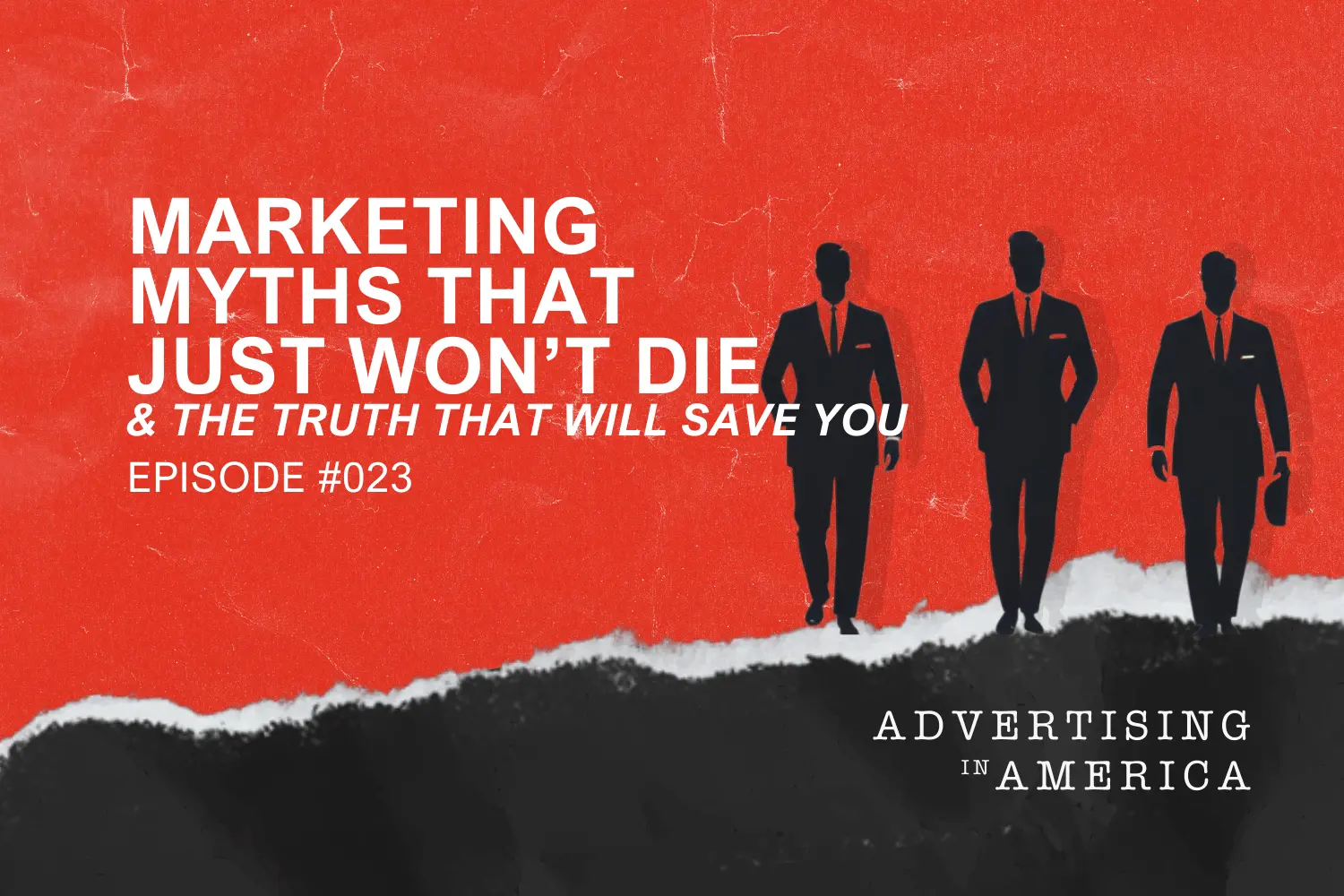

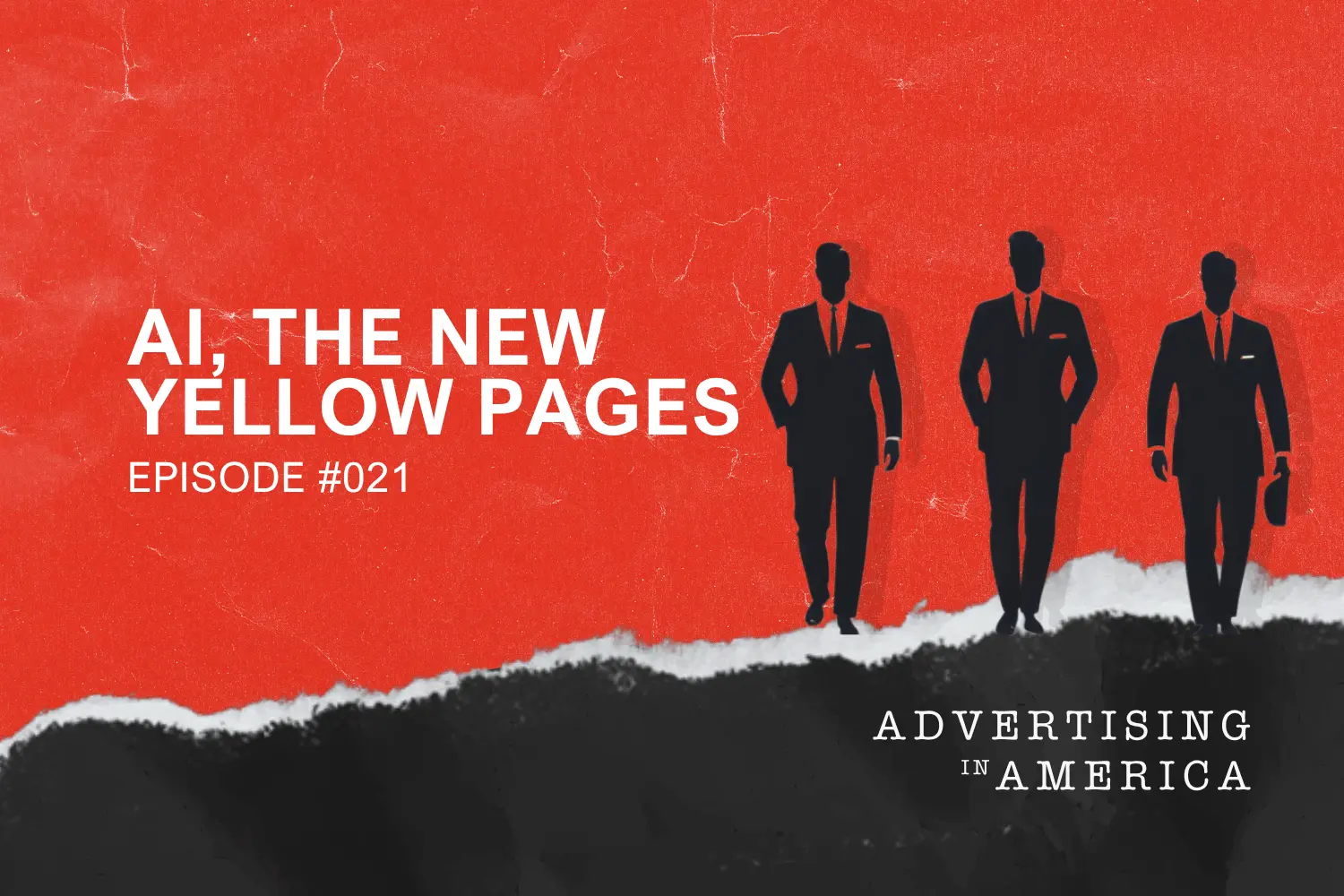

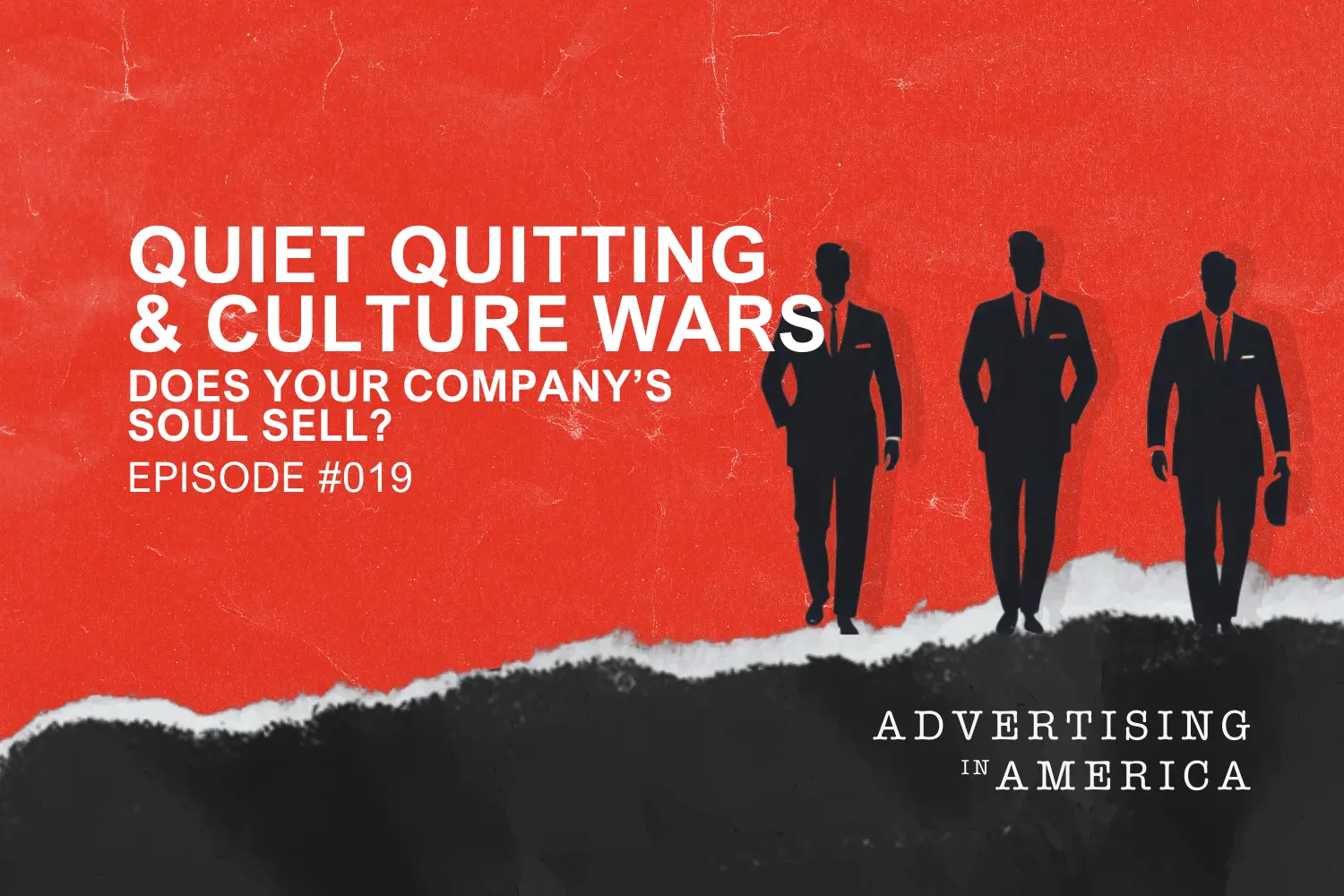
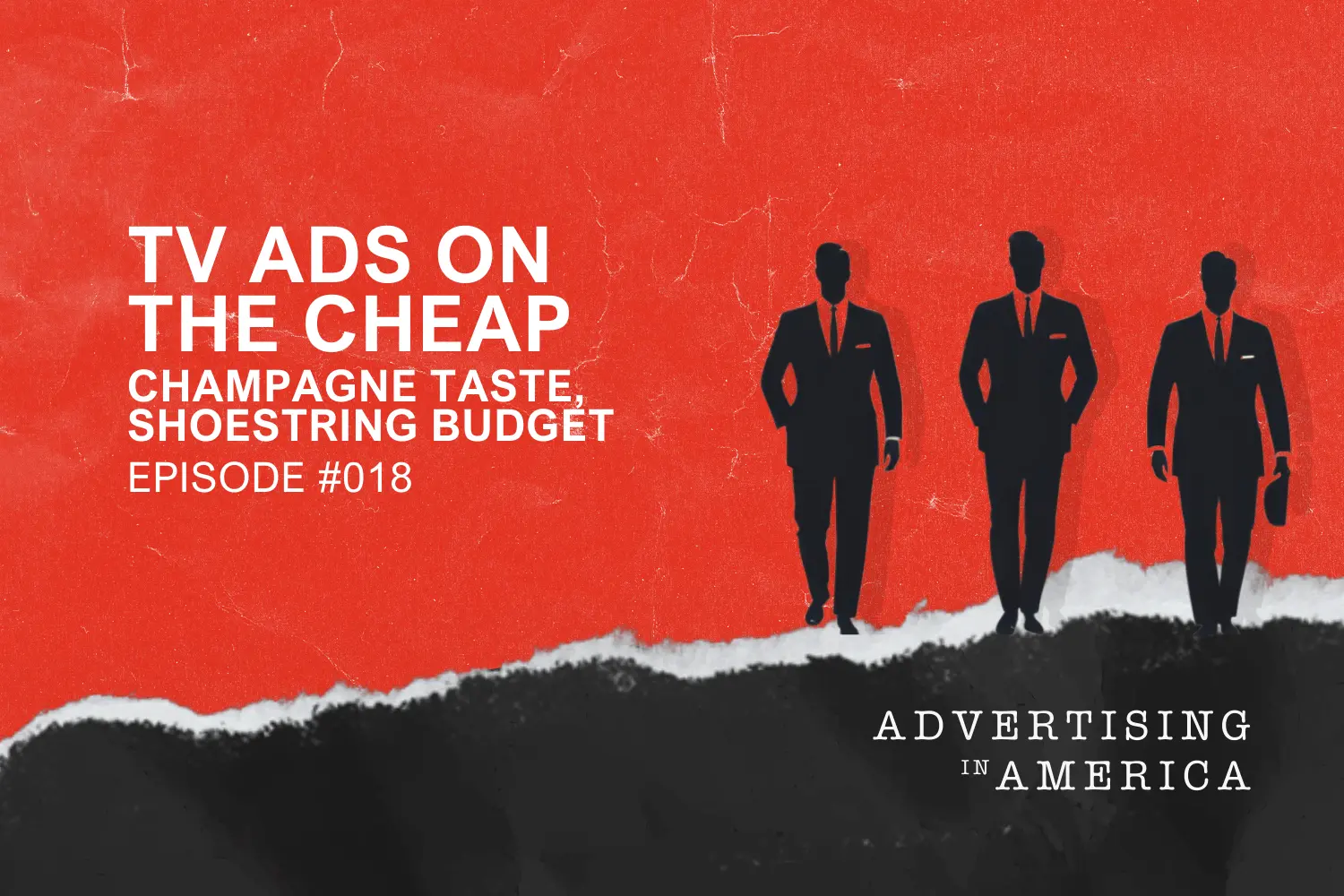
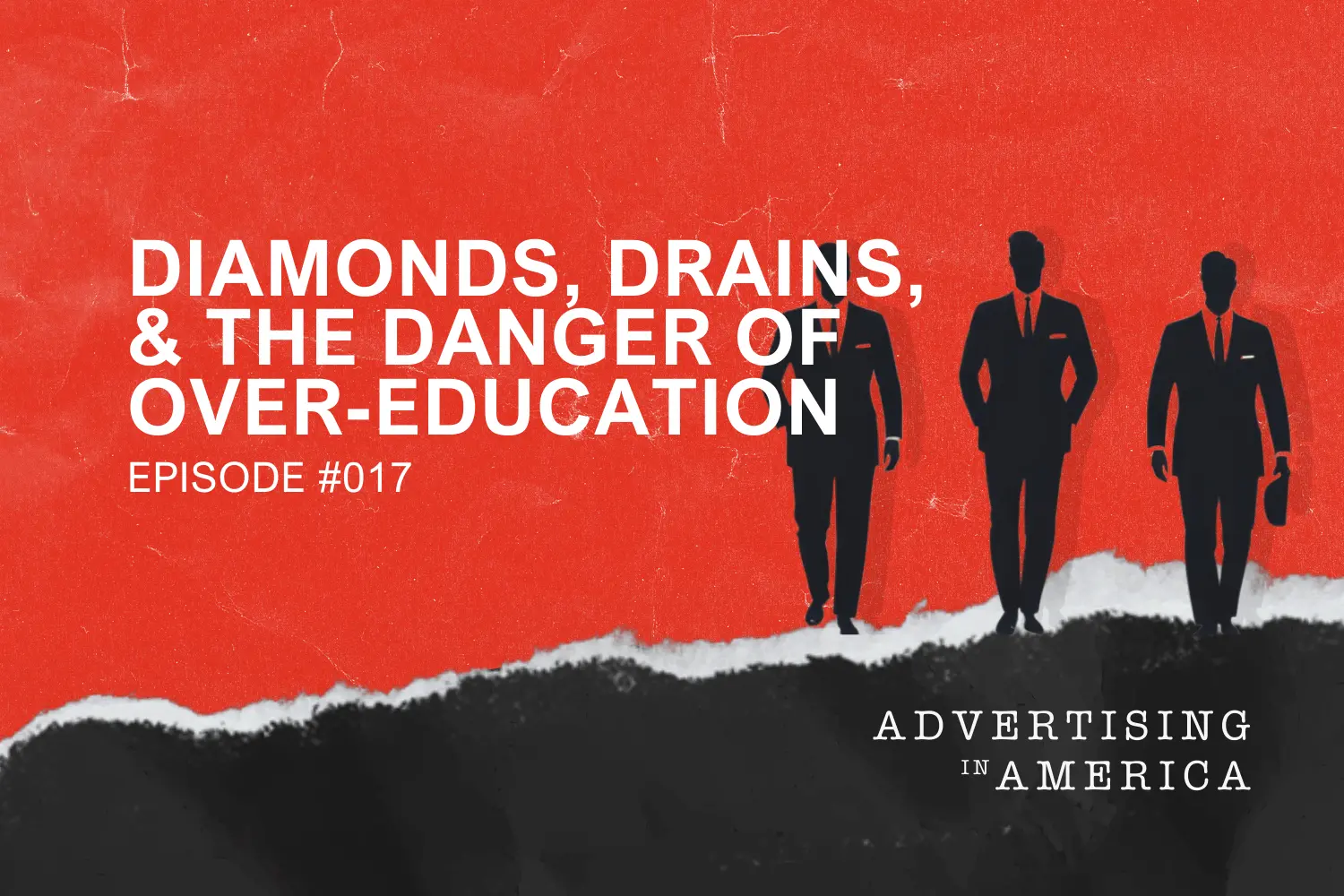
.webp)
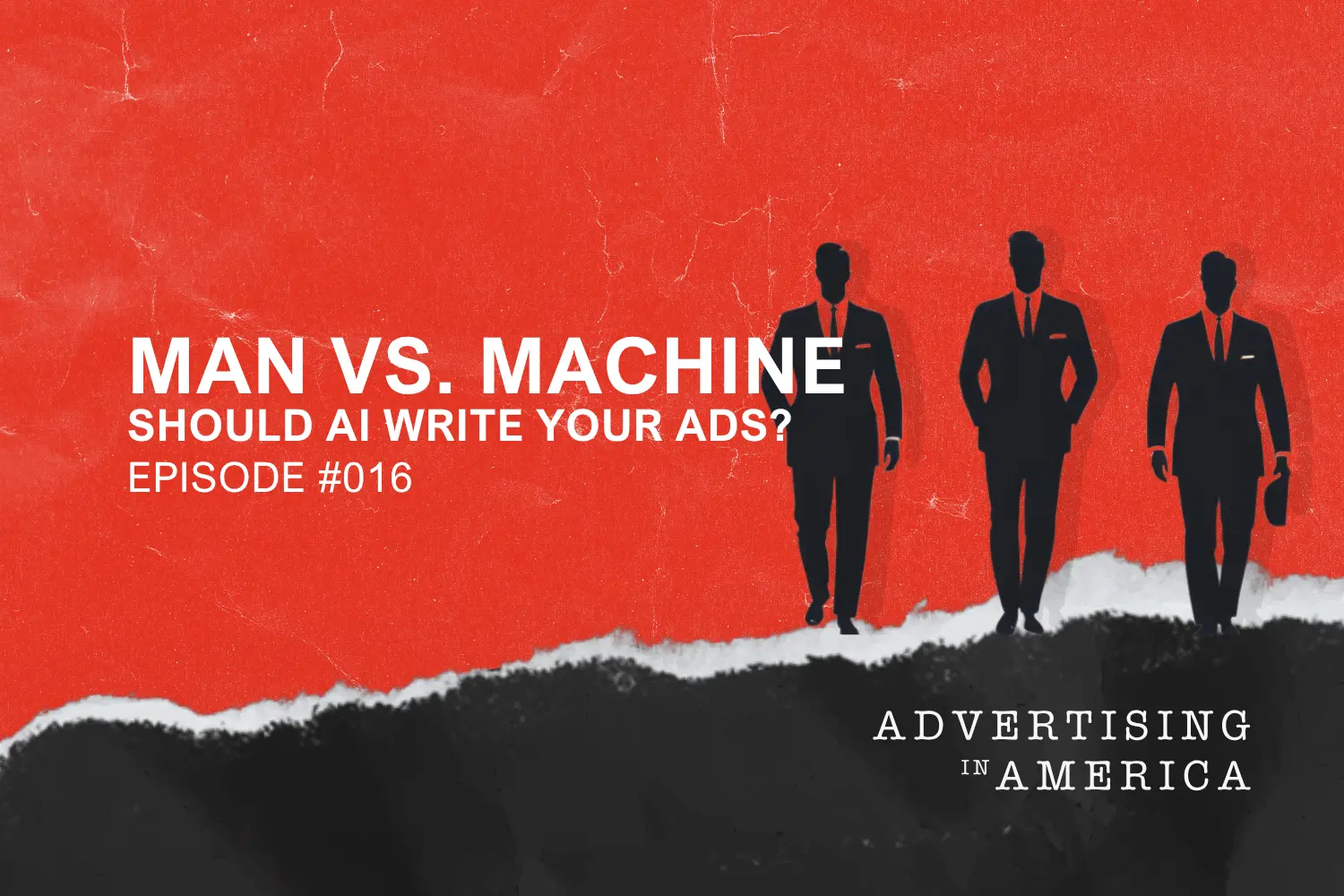










.webp)

.webp)
.webp)

%20(1).webp)
.webp)
.webp)




.webp)


.webp)






.webp)



.webp)
.webp)


.webp)
.webp)







